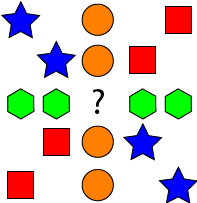
Video lecture for this chapter
There is no known physical force from the planets that can have any effect on a person at the moment of birth. The only possible force would be gravity but the gravitational pull of the obstetrician delivering the baby is greater than the gravity from any of the planets! The Earth's gravity on the baby is tens of thousands of times stronger than the gravity on the baby from the Sun or Moon. Astrologers are forced to invoke mystical forces for which there is NO physical proof.
Many people read their horoscope in the newspaper not to get a prediction of what will happen to them, but, rather, to get advice on what they should do in the day (in the United States the horoscope columns focus on who to date and how best to gain money). A person who is serious about using astrology to guide their actions should consult several horoscope columns every day to be sure they have the most accurate information. Unfortunately, that person would find out that the horoscopes for him/her are not consistent with one another even though the horoscopes are phrased as vaguely as they are. Astrology is not as systematic as it claims to be.
Many tests comparing the birthdates of national or state leaders have found the birthdates to be randomly distributed among the twelve signs. If astrology could determine a person's future or his/her personality, then the leaders should have birthdates in one or two signs. Other tests on the birthdates of those who re-enlist in the Marines have also found a completely random distribution of birthdates among all of the signs. (I do not say this in a disparaging way. Surely, you'll agree that it takes a particular type of personality to do well in the Marines and to want to re-enlist. There's good reason why their advertising slogan is "The Few. The Proud.") A recent episode of NOVA (on PBS) showed a researcher testing astrology by giving each person in a college class of astrology believers their own individual authentic horoscope. Not surprisingly, they found some event in their day that fitted their horoscope. The students then gave their horoscope to the person sitting behind them. To their surprise or dismay, the students discovered the substituted horoscopes were just as good! (Yes, the students had birthdays spread throughout the year.) There are numerous cases of twins or triplets having different personalities and life events even though their birth times and places were very close to one another.

Usually, those who seek out astrologers just want some guidance of any kind. If they feel the horoscope interpretation was prepared just for them, then they will find agreement with reality. Astrology cannot be proven wrong—testable predictions cannot be made because if someone is already convinced of the validity of the horoscope or astrologer's prediction, they will use their natural creativity to "fill in the gaps" and to make sense of contradictions: to reinterpret the prediction to fit what happened.
As an example of this, consider reading your horoscope (it is in the entertainment section of my local newspaper) in the morning. It tells you that "you're going to have a bad day—the 'stars' are not aligned for you today—so watch out!" You drive to work or school and when your light turns green, someone in the cross traffic runs through their red light. The horoscope is coming true! You continue on and someone very rudely cuts right in front of you. You think your horoscope was right on despite the fact that in [insert your town and/or state], people are always running red lights and people are always cutting off others. (Don't think that that other driver was giving you a friendly salute…) You concentrate on the bad things during that day.
Now consider reading your horoscope another morning and it says something like "Congratulations! This is your day—the 'stars' are aligned for you today." You drive to work and someone runs that red light, but no problem—that's not unusual. Someone else cuts right in front of you, but, no problem, that was just one person. All the rest of the people were so courteous today. Yes, your horoscope is correct. You concentrate on the good things during that day.
In a more rigorous test of this, Michel Gaugelin (a French researcher) sent a horoscope of a mass murderer to 150 people but told each one that the horoscope was prepared just for him or her. Over ninety percent of them said they could see themselves in that horoscope. If a person is already convinced ahead of time of the validity of something like a horoscope or a psychic's prediction, then he or she will be easily able to use his or her natural problem-solving capabilities and creativity to make sense of the vague, even contradictory statements. The Australian researcher Geoffrey Dean substituted phrases in the horoscopes of 22 people that were opposite of the original phrases in the horoscopes. Ninety-five percent of time they said the horoscope readings applied to them just as well as to the people to whom the original phrases were given. An astrologer relies on her client's ability to create meaning in even random data and to fill in the gaps of incomplete information if some context is given (or if the creative client makes up a context himself). The astrologer's predictions will always be "correct", not testable as a scientific theory or prediction must be.
![]() Go back to previous section --
Go back to previous section --
![]() Go to next section
Go to next section
last updated: November 26, 2021